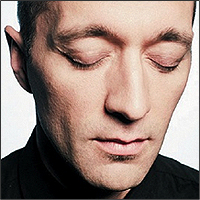Theo Bleckmann
// vocalist, performer & composerTHEO BLECKMANN is a vocalist, performer, and composer based in New York City. He has forged his own sound in contemporary music today, drawing from jazz, ambient, and electronic music, often integrating extended vocal technique as well as live electronic processing and looping. Bleckmann’s voice can be heard on over forty recordings. Theo Bleckmann and Kirk Nurock Duo’s “Theo & Kirk” (1995), and “Looking-Glass River” (1995) are both available from Traumton-Indigo, Theo Bleckmann and Ben Monder’s “No Boat” (1997), and Theo Bleckmann’s “Origami” (2001) are both available from Songlines Recordings, Theo Bleckmann and John Hollenbeck’s “Static Still” (2002) is available from GPE Records, “Anteroom” (2005) is available from Traumton Records, Theo Bleckmann and Fumio Yasuda’s “Las Vegas Rhapsody: The Night They Invented Champagne” (2006) is available from Winter & Winter, Theo Bleckmann and Ben Monder’s “At Night” (2007) is available from Songlines Recordings, Theo Bleckmann and Fumio Yasuda’s “Berlin: Songs Of Love And War, Peace And Exile” (2008), Theo Bleckmann and Kneebody’s “Twelve Songs By Charles Ives” (2009), and Refuge Trio’s “Refuge Trio (Self-Titled)” (2009) are all available from Winter & Winter. Theo Bleckmann’s music essay “The Voices Of My Voice” appears in John Zorn’s “Arcana III: Musicians On Music” (2008) available from Hips Road. Theo Bleckmann has also collaborated with Laurie Anderson, Anthony Braxton, Steve Coleman, Dave Douglas, Phillip Glass, Meredith Monk, and John Zorn.
Website: www.theobleckmann.com
Photo: Susie Knoll
Interview:
Some musicians can communicate an unbelievably high degree of spirituality through their music without ever showing that spirituality in their personal or public lives whatsoever. It’s astonishing, really: how can I be comforted, deeply moved, and so inspired by the work of artists who are basically narcissistic and often egomaniacal? Is it because music is the sole outlet for their spiritual energy, thereby amplifying that energy within the music? Do they channel all their spiritual energy into music, so that there is nothing left for anyone or anything else? Or is it perhaps that their music is so divine that their amazingly destructive personalities are somehow balanced out through art itself? Music, in and of itself, is not spirituality. But, like music, spirituality flourishes in an environment of discipline, focus, and the release of ego. Music can be more than the mere execution and communication of awe-inspiring technique and emotion. It can become a practice; a spiritual practice that reaches far beyond music itself. The practice of music and practicing music can be a great act of love: loving yourself, loving your co-musicians, loving the listener, and loving those that are not there to listen, all at once, all in one note, one breath. And in that practice, music has become love and love manifests as music. Maybe it is my own yearning for spirituality that allows me to be moved so deeply by others?
“Music by itself is not spirituality. But like music, spirituality flourishes in an environment of discipline, focus, and letting go of ego.”
– Theo Bleckmann, vocalist, performer, and composer


